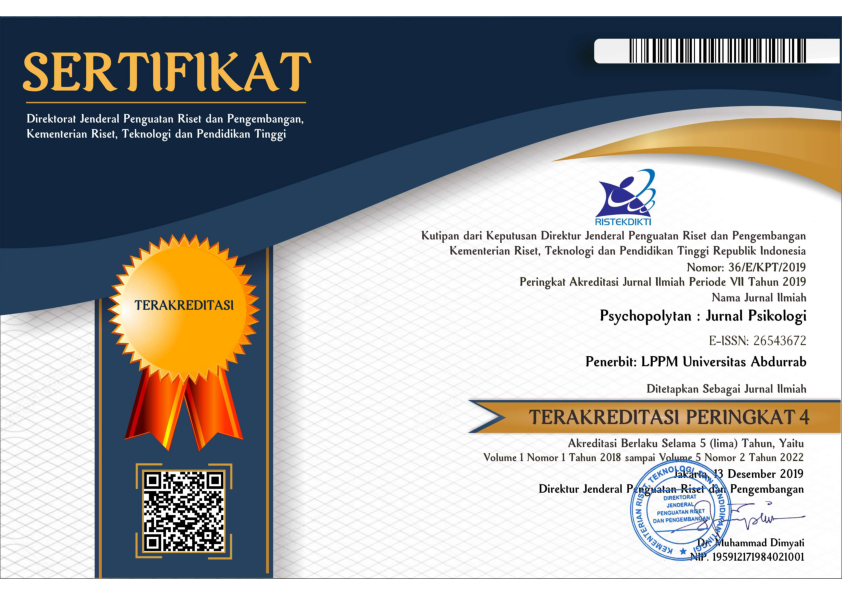Kepemimpinan Transformasional dan Efikasi Kolektif Karyawan Selama Pandemi Covid-19
(Submitted 31 Agustus 2021) (Published 28 Februari 2022)
Abstract
Kebijakan work from home (WFH) selama pandemi Covid-19 di Indonesia membawa dampak perubahan diberbagai bidang khususnya di dunia industri dimana banyak pekerjaan yang melibatkan kerjasama tim. Keberhasilan kerjasama tim dalam menyelesaikan tugas dan pekerjaan membutuhkan efikasi kolektif, yaitu sebuah keyakinan bersama sebuah tim untuk dapat menuntaskan dengan baik terkait pekerjaan yang sedang ditangani. Menurut berbagai studi salah satu faktor penentu kuatnya efikasi kolektif disebabkan oleh kepemimpinan transformasional, yaitu kemampuan pemimpin di dalam memberdayakan anggotanya dengan optimal. Tujuan penelitian ini berusaha mengungkap bagaimana peran kepemimpinan transformasional terhadap efikasi kolektif karyawan selama WFH. Subjek penelitian ini adalah 152 karyawan yang bekerja di perusahaan milik negara (BUMN) dan perusahaan milik swasta (BUMS) di daerah Jawa Timur yang diperoleh menggunakan teknik random sampling. Instrumen yang digunakan adalah skala kepemimpinan transformasional dan skala efikasi kolektif. Berdasarkan uji regresi linier sederhana didapatkan data bahwa ada peran kepemimpinan transformasional terhadap efikasi kolektif karyawan selama WFH (R=0.350, P=0,000<0,005). Artinya kepemimpinan transformasional mampu memprediski efikasi kolektif karyawan dalam menuntaskan pekerjaan yang ditangani. Kontribusi sumbangan efektif kepemimpinan transformasional terhadap efikasi kolektif karyawan dalam penelitian ini sebesar 12,3%
References
Ahmad, F., Abbas, T., Latif, S., Rasheed, A. (2014). Impact of transformational leadership on employee motivation in telecommunication sector. Journal of Management Policies and Practices, 2(2), 11-25.
Anisah, C., & Wisesa, A. (2021). The impact of covid-19 towards employee motivation and demotivation influence employee performance: a study of sayurmoms. Eqien - jurnal ekonomi dan bisnis, 8(2). 371-380. https://doi.org/10.34308/eqien.v8i2.254
Asbari, M., Novitasari, D., & Goestjahjanti, F.S. (2020). Mempertahankan kinerja karyawan di masa pandemi covid-19: studi kasus pada industri ritel. JMK (Jurnal Manajemen dan Kewirausahaan), 5(3), 183-2013.
Azizah, F.A.U. (2017). Hubungan efikasi kolektif dengan kinerja karyawan dinas pendidikan. Skripsi. Fakultas Psikologi Universitas Muhammadiyah Malang.
Bandura, A. (1997). Self efficacy : the exercise of control. W.H. Freeman and Company : New York
Bass, B.M. (1999). Two decades of research and development in transformational leadership. European Journal of Work and Oragnizational Psychology, 8(1), 9-32.
Bass, B.M., Riggio, R.E. (2006). Transformational Leadership (2nd ed). Lawrence Erlbaum Associates : Mahwah, New Jersey
Çalik, T., dkk. (2012). Examination of relationships between instructional leadership of school principals and self-efficacy of teachers and collective teacher efficacy. Educational Sciences: Theory & Practice, 12(4), 1-7.
Çepikkurt, F., Uluöz, E. (2017). Predictive power of group cohesion and perceived motivational climate for collective efficacy perception in the football teams. Sp Soc Int J Ph Ed Sp, 17(1), 91-97
Demir, K. (2008). Transformational leadership and collective efficacy: the moderating roles of collaborative culture and teachers’ self-efficacy. Egitim Arastirmalari - Eurasian Journal of Educational Research, 33, 93-112.
Dua, M.H.C., & Mea, M. (2020). Pengaruh work from home terhadap work life balance pekerja perempuan di kota Ende. Jurnal Ilmiah Manajemen Bisnis Dan Inovasi Universitas Sam Ratulangi, 7(2), 247-258.
Gita, R., Yuniawan, A. (2016). Pengaruh gaya kepemimpinan transformasional, motivasi kerja, dan budaya organisasi terhadap kinerja karyawan. Diponegoro Journal Of Management, 5(3), 1-12.
Hemsworth, D., Muterera, J., & Baregheh, A. (2013). Examining Bass’s transformational leadership in public sector executives: A psychometric properties review. The Journal Of Applied Business Research, 29(3), 853-862.
Jowett, S., Shanmugam, V., & Caccoulis, S. (2012). Collective efficacy as a mediator of the association between interpersonal relationships and athlete satisfaction in team sports. International Journal of Sport and Exercise Psychology, 10(1), 66-78.
Joe, S.-W., & Lin, C.-P. (2008). Learning online community citizenship behavior: A socio- cognitive model. CyberPsychology & Behavior, 11(3), 367–370
Jung, D.I., Sosik, J.J. (2002). Transformational leadership in work groups the role of empowerment, cohesiveness, and collective-efficacy on perceived group performance. Small Group Research, 33(3), 313-336.
Lippe, T.V.D., & Lippényi, Z. (2019). Co-workers working from home and individual and team performance. Brian Towers (BRITOW) and John Wiley & Sons Ltd, 1-2-, ISSN 1468-005.
Martínez, J.R., Guillén, F., & Feltz, D. (2011). Psychometric properties of the spanish version of the collective efficacy questionnare for sports. Psicothema, 23(3), 503-509.
Mustajab, D., dkk (2020). Working from home phenomeno as an effort to prevent Covid-19 attacks and its impacts on working productivity. The International Journal Of Applied Business, 4(1), 13-21.
Pratama, A.D. (2018). Hubungan gaya kepemimpinan transformasional dengan group efficacy. Skripsi. Fakultas Psikologi Universitas Muhammadiyah Malang.
Setyawan, F.W.B., & Lestari, R. (2020). Challenges of stay-at-home policy implementation during the coronavirus (Covid-19) pandemic in Indonesia. Jurnal Administrasi Kesehatan Indonesia, 8(1), 15-20
Smith, B. N., Montagno, R. V., & Kuzmenko, T. N. (2004). Transformational and servant leadership: content and contextual comparisons. Journal of Leadership and Organizational Studies, 10 (4), 80-91.
Tucunan, R.J.A., Supartha, W.G., & Riana, I.G. (2014). Pengaruh kepemimpinan transformasional terhadap motivasi dan kinerja karyawan (studi kasus pada PT. Pandawa). E-Jurnal Ekonomi dan Bisnis Universitas Udayana, 3(9), 535-550.
Wahyu, E.E., Widodo, T.W., Kurniawan, C.N. (2020). Urgensi kepemimpinan transformasional dan kecerdasan emosional pada perusahaan dalam merespons pandemi covid-19. Seminar Nasional Gabungan Bidang Sosial, Politeknik Negeri Malang.
Yuwono, Teguh., dkk. (2020). Analisis pengaruh efektivitas kepemimpinan transformasional dan kesiapan untuk berubah terhadap kinerja karyawan wanita di masa pandemi Covid-19. Jurnal Ilmiah Mahasiswa Ekonomi Manajemen, 5(3), 615-632.
Zhang, A. Y., Tsui, A. S., & Wang, D. X. (2011). Leadership behaviors and group creativity in Chinese organizations: The role of group processes. Leadership Quarterly, 22, 851-862.
Copyright (c) 2022 Psychopolytan : Jurnal Psikologi

This work is licensed under a Creative Commons Attribution-NonCommercial-ShareAlike 4.0 International License.
1. Copyright of all journal manuscripts is held by the Psychopolytan : Jurnal Psikologi
2. Formal legal provisions to access digital articles of electronic journal are subject to the provision of the Creative Commons Attribution-ShareAlike license (CC BY-NC-SA), which means that Psychopolytan : Jurnal Psikologi is rightful to keep, transfer media/format, manage in the form of databases, maintain, and publish articles.
3. Published manuscripts both printed and electronic are open access for educational, research, and library purposes. Additionally, the editorial board is not responsible for any violations of copyright law.
licensed under a Creative Commons Attribution-ShareAlike 4.0 International License.
 pdf
pdf
 Abstract views: 900
Abstract views: 900
 downloads: 810
downloads: 810

 :
:








